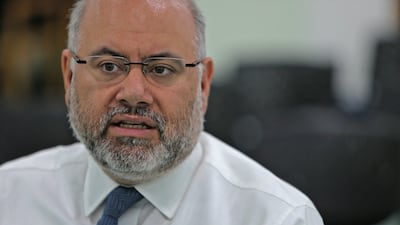Prices for life-saving medication skyrocketed in Lebanon on Tuesday after the Ministry of Public Health began lifting most drug subsidies, which the cash-strapped state can no longer afford.
Health Minister Firass Abiad had announced last Tuesday a plan to gradually lift subsidies on certain types of medication including those used to treat heart disease, high cholesterol and high blood pressure, causing drug prices to increase by as much as five or six times their original cost.
The ministry issued a new price list on Monday afternoon that was put in place on Tuesday for the first time, pharmacists say.
Pharmacist Georges Zammar said that customers were not expecting the sudden increase and that he had to deal with angry and dumbfounded clients all day.
“I would say 90 per cent of parents asking for baby formula today left my pharmacy empty-handed. They simply didn’t have the money to pay for it,” he said from Pharmacy Radio in Beirut.
The new pricing has become unaffordable for many in a country where about 80 per cent of the population lives in poverty, according to UN data.
A packet of baby formula that lasts three days used to cost 12,000 Lebanese pounds ($0.50 at the market rate) before the latest decision.
The same packet is now priced at 98,000 pounds ($4.20).
Since late 2019, the Lebanese pound has lost more than 90 per cent of its worth, slashing the value of salaries as costs for basic goods rise.
The minimum wage of 675,000 Lebanese was worth $450 in 2019. It is now equal to less than $30.
But medicines for cancer, incurable diseases, mental and psychological diseases, and drugs used in hospitals have retained their subsidies, a representative for the health ministry told The National.
The Lebanese state spends $35 million on medical subsidies each month, down from $130 million prior to subsidy cuts, Mr Abiad said last week.
The ministry will maintain a 65 per cent subsidy rate on expensive medicines for chronic diseases, while cheaper, generic products will receive less state support, the minister said.
Only wealthy customers, however, will be able to afford the new prices, said Noura, a pharmacist employed at Wardieh Pharmacy in Beirut.
“People who can afford to buy medicine are still getting them, but those who do not have the means will suffer,” she said from behind the counter of an empty drugstore, plunged in darkness due to daily power cuts.
Lebanon has been in economic free fall for the past two years. A lack of foreign currencies, compounded by decades of endemic corruption and political inaction have left the state unable to provide for its citizens.
Petrol, electricity and now medicine are out of reach for many as subsidies for these products have been gradually lifted, with no other social safety net in place for the needy.
The country imports 80 per cent of its drugs in foreign currencies, which the central bank lacks, causing payment delays and shortages.
Subsidised medicines are also routinely smuggled to neighbouring Syria, worsening shortages.
Pharmacists told The National that shortages persist despite the lifting of subsidies, but that the decision may help alleviate the lack of medicine in the long run.
Talal, a taxi driver, says that the decision to lift subsidies means he can no longer afford the medicine he needs for his high blood pressure.
“I went to the pharmacy this morning and couldn’t believe my eyes,” he said. “How am I supposed to afford my drugs now?”








